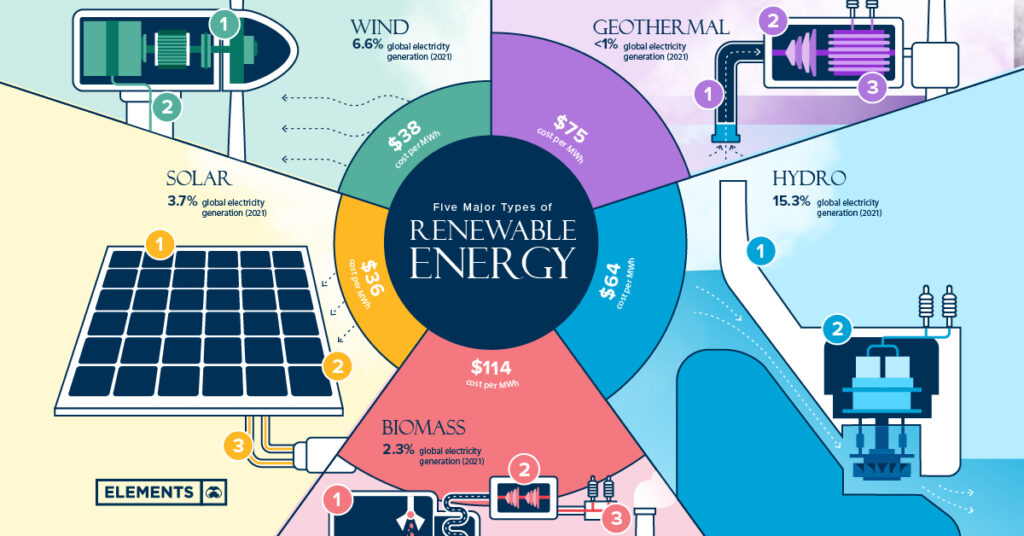What are the 4 main types of sustainable energy?

Sustainable energy is a crucial topic in today's world, as we strive to find alternative sources of power that are environmentally friendly and renewable. In this article, we will explore the four main types of sustainable energy and their importance in shaping a greener future.
The Importance of Sustainable Energy
Sustainable energy plays a vital role in mitigating climate change and reducing our dependence on fossil fuels. By harnessing renewable resources, we can minimize greenhouse gas emissions and create a more sustainable and resilient energy system. The transition to sustainable energy sources is not only necessary for the health of our planet but also presents economic opportunities and energy security.
The Four Main Types of Sustainable Energy
Solar Power
Solar power is the conversion of sunlight into electricity through the use of photovoltaic cells. This type of sustainable energy is abundant, clean, and inexhaustible. Solar panels can be installed on rooftops or in large solar farms to capture the sun's energy and convert it into usable electricity.
Wind Power
Wind power harnesses the kinetic energy of the wind to generate electricity. Wind turbines, typically found in wind farms, have large blades that rotate as the wind blows. This rotational motion is then converted into electrical energy through a generator. Wind power is a highly sustainable energy source, as it produces no emissions and relies on the natural movement of air.
Hydroelectric Power
Hydroelectric power utilizes the gravitational force of falling or flowing water to generate electricity. Dams are built to store water in reservoirs, and when released, the water flows through turbines, turning them to produce electricity. Hydroelectric power is a reliable and renewable energy source that provides a constant supply of electricity, often with minimal environmental impact.
Geothermal Energy
Geothermal energy harnesses the heat from the Earth's core to generate electricity. This sustainable energy source utilizes the natural heat found beneath the Earth's surface to produce steam, which drives a turbine connected to a generator. Geothermal power plants can operate continuously, providing a stable and renewable energy supply.
Advantages and Disadvantages of Each Type
While each type of sustainable energy has its advantages and disadvantages, they all contribute to reducing carbon emissions and promoting a cleaner environment. Solar power and wind power are both abundant and widely available, but their intermittent nature can pose challenges in terms of energy storage. Hydroelectric power offers a consistent energy supply, but it can have significant ecological impacts on river ecosystems. Geothermal energy is reliable but limited to areas with accessible geothermal reservoirs.
Conclusion
As we strive for a sustainable future, understanding and harnessing the power of renewable energy sources is crucial. Solar power, wind power, hydroelectric power, and geothermal energy are the four main types driving the transition to a greener and more sustainable world. By embracing these sustainable energy sources, we can mitigate climate change, reduce pollution, and secure a brighter future for generations to come.
Frequently Asked Questions
What is sustainable energy?
Sustainable energy refers to energy sources that are renewable, environmentally friendly, and have minimal negative impacts on the planet. These sources include solar power, wind power, hydroelectric power, and geothermal energy.
How does solar power work?
Solar power works by converting sunlight into electricity using photovoltaic cells. These cells absorb sunlight and generate a flow of electrons, creating an electric current that can be used to power homes, buildings, and appliances.
What are the benefits of wind power?
Wind power has several benefits, including being a clean and renewable energy source. It produces no emissions, reduces reliance on fossil fuels, and can provide a steady source of electricity in areas with consistent wind patterns.
Is hydroelectric power renewable?
Yes, hydroelectric power is considered a renewable energy source. As long as there is a constant supply of flowing or falling water, hydroelectric power can be continuously generated without depleting the resource.

Leave a Reply